Israel Tells Top US General It Sees Need To Cooperate Against Iran
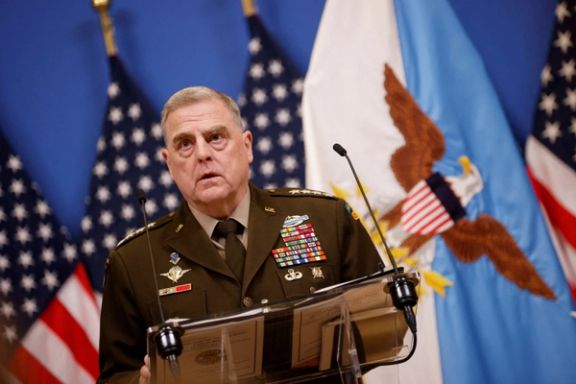
Israel hosted the top US military officer, General Mark Milley, Friday for discussions that it said included the need for cooperation to deny Iran nuclear weapons.

Israel hosted the top US military officer, General Mark Milley, Friday for discussions that it said included the need for cooperation to deny Iran nuclear weapons.
Milley made the previously unannounced visit ahead of a trip to Israel by US Defense Secretary Lloyd Austin that will also include neighboring Egypt and Jordan - US-aligned Arab states that have influence on Israeli-Palestinian affairs.
"Ongoing cooperation is required in order to prevent Iran from gaining a nuclear weapon," Israeli Defense Minister Yoav Gallant's office quoted him as telling Milley, chairman of the US Joint Chiefs of Staff.
Milley made no public remarks in Israel. His spokesperson said Milley discussed regional security issues and "coordination to defend against threats posed by Iran" in his talks with Chief of the Israeli General Staff Lieutenant General Herzi Halevi.
Amid its long-stalled negotiations with world powers on renewing a 2015 nuclear deal, Iran has made advances with technologies that could potentially yield it a bomb. Tehran denies having any such plan.
In January, the United States and Israel held what one US official described as the allies' most significant joint military exercise to date, involving thousands of forces, a dozen ships and 142 aircraft, including nuclear-capable bombers.
Milley's trip also comes amid spiraling violence in the West Bank, with stepped-up Israeli military raids following a spate of Palestinian attacks. Fears of escalation ahead of the Muslim holy month of Ramadan and the Jewish Passover festival have prompted the United States, Jordan and Egypt to appeal for calm.
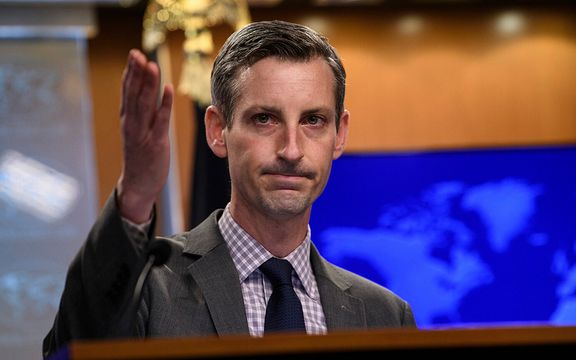
The US remained silent on a high-level visit from Israeli officials to Washington next week, reluctant to go public on behind the scenes discussions on Iran's nuclear progress.
In a press conference, State Department spokesman, Ned Price, simply said the US engages regularly with its Israeli partners. "We have traveled to the region; our Israeli partners have traveled here. I expect that will continue in the coming days, weeks, and months."
However, on Israeli news site Axios, reports claim that Israeli Minister for Strategic Affairs Ron Dermer and national security adviser Tzachi Hanegbi, are expected to visit Washington early next week for meetings with senior Biden administration officials that will focus on Iran.
The visit comes in the wake of news from a top US defense official, Colin Kahl, the undersecretary of defense for policy, that Iran will need only 12 days to enrich enough weapons-grade uranium to build one nuclear bomb.
In public, the US has said it does not believe Iran has made the decision to resume its weaponization program but Israeli Prime Minister Benjamin Netanyahu and other Israeli officials have stressed in recent weeks the need for a credible military threat against Iran.
On Tuesday, Kahl said that since the Trump administration withdrew the US from the Iran nuclear deal in 2018, Tehran's nuclear progress has been "remarkable."
He added that before the Trump administration left the nuclear agreement, Iran needed a year to break out and get enough 90% enriched uranium for one nuclear bomb.
Both Dermer and Hanegbi are at the helm of Israel's Iran policy and are expected to meet White House national security adviser Jake Sullivan, Secretary of State Tony Blinken and other senior US officials, according to Axios.
The visit takes place amidst growing domestic tensions in Israel in the wake of the new right-wing government, and tensions growing across the West Bank.
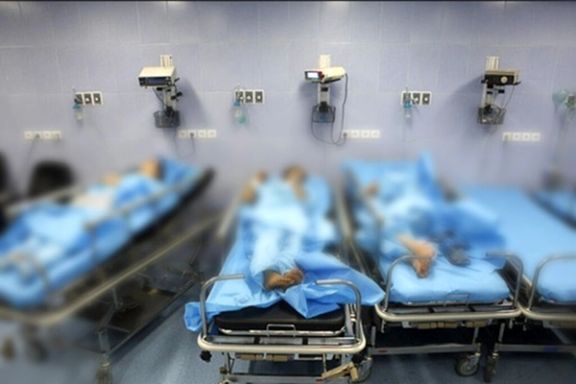
Rights groups have spoken out in support of the scores of Iranian schools targeted by mysterious chemical gas attacks since November which have left hundreds of girls sick and many hospitalized.
Amnesty International and UNICEF issued statements on Thursday to condemn the attacks, which many have described as intentionally ignored by the regime.
Schoolgirls have been “at the forefront of protests and many bravely defied discriminatory compulsory veiling laws,” Amnesty said, noting that such attacks raise concerns of increasing gender-based violence against women and girls for standing up for their rights.
On Friday, German Foreign Minister Annalena Baerbock, joined foreign leaders in condemning the attacks. She said, "Girls must be able to go to school without fear... This is nothing less than their human right. All cases must be fully investigated."
White House national security spokesman John Kirby expressed deep concerns about the poisonings as the world demands answers as to who the culprits are and what the agent being used is.
At least 58 schools in one-third of the country’s provinces have been attacked by unidentified gases since November 30 when the first case of poisoning among schoolgirls was reported in the religious city of Qom. Around 1,000 students have become ill with the mysteriously dispersed, unidentified fumes so far.
The country's interior minister, Ahmad Vahidi, an ex-IRGC top officer wanted by Interpol for his part in the bombing of a Jewish community center in Buenos Aires in 1994, has been tasked with leading the investigation, though has so far denied fowl play.
A teachers’ union in Iran and some other activists have urged people to stage a protest on Tuesday to condemn school gas attacks, demanding an explanation from the Supreme Leader.
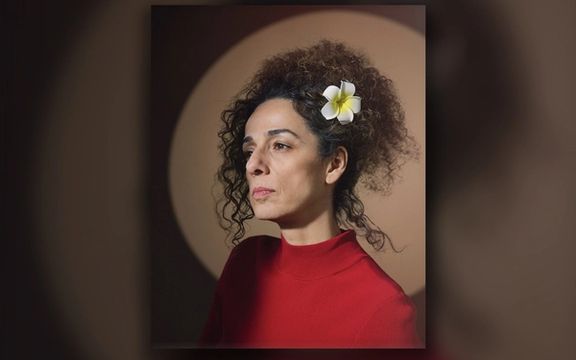
Iranian activist Masih Alinejad, the target of terror plots by regime intelligence, has been nominated for the prestigious TIME magazine Women of the Year list.
Journalist Alinejad, now a face of the revolution, has lived in exile in the US since 2009 after exposing corruption in Iran. Seen as a profound threat to the regime led by Ayatollah Khamenei, Alinejad said: “Women of Iran are his [Khameini’s] biggest enemy.”
She has refused to stay silent in spite of repeated threats to her life, which resulted in the indictment of four men by the US in 2021, planning to kidnap the vocal activist. She has helped bring the revolution to the global stage during five months of unrest triggered by the death in custody of Mahsa Amini, arrested for the inappropriate use of her hijab.
Alinejad is one of 12 women globally who made the list, which highlights leaders who are using their voices to fight for equality. They come from a range of backgrounds from activism and government to sports and the arts.
They include Anielle Franco who turned to politics after her sister Marielle, a city councilor in Rio de Janeiro who campaigned against police violence and corruption, was assassinated in 2018. Now, as Minister for Racial Equality in Brazil’s new government, she is channeling her grief into action.
Others include Ukrainian LGBTQI activist Olena Shevchenko, Pakistan's Ayisha Siddiqa, who after witnessing the devastating effects of climate change on her community was inspired to speak up, delivering a powerful speech at November’s UN Climate Conference in Egypt on the urgency of climate justice.
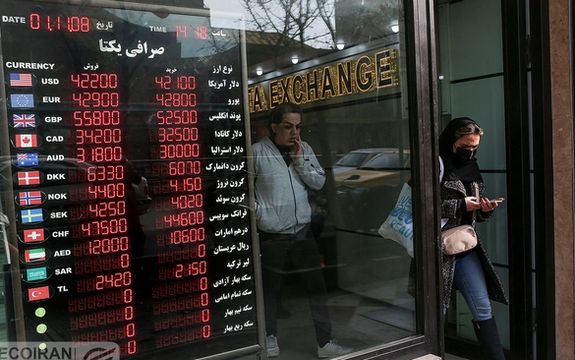
Iran’s national currency has bounced back in the past three days, regaining about 10 percent of its lost value since a historic low four days ago, leaving pundits wondering about the reason.
The exchange rate of the dollar touched over 600,000 rials earlier on Sunday but the Iranian currency began to rise to close at about 540,000 against the dollar on Thursday, which is the last weekday in Iran.
Despite the rebound, the rial is still down 100 percent compared to six months ago.
Iranian media is replete with different scenarios for the rebound, but the most plausible explanation still seems to have been the injection of a large amount of foreign currency into the market by the Central Bank of Iran.
Another reason mentioned in Tehran media is a bit far-fetched guesswork that the country's foreign minister's trip to Geneva during the week and the possibility of resuming negotiations to revive the 2015 nuclear deal injected some optimist into the market.
In an article earlier in the week, Jomhouri-e Eslami newspaper argued that fluctuations in the market are out of the hands of the government as the country’s economy is tied to the fate of Iran’s nuclear deal and its relations with the other countries. The paper and other media outlets speculated that foreign minister Hossein Amir-Abdollahian’s trip to attend a United Nations human rights meeting might also re-open the door to nuclear talks resulting in the lifting of US sanctions.
The paper described the extreme rise and fall of the dollar in only a few days as a lesson for the authorities, highlighting that the country can survive the current critical period through reviving the JCPOA and declaration of neutrality in the Russian invasion of Ukraine as well as a practical approach to a balanced policy in international relations.
Reports about the imminent visit by the head of the International Atomic Energy Agency (IAEA) Rafael Grossi to Iran for high-level meetings, purportedly slated for Friday, was another reason mentioned by the country’s media. The visit comes amid discussions with Tehran on the origin of uranium particles enriched to up to 83.7% purity, very close to weapons grade, at its Fordow enrichment plant.
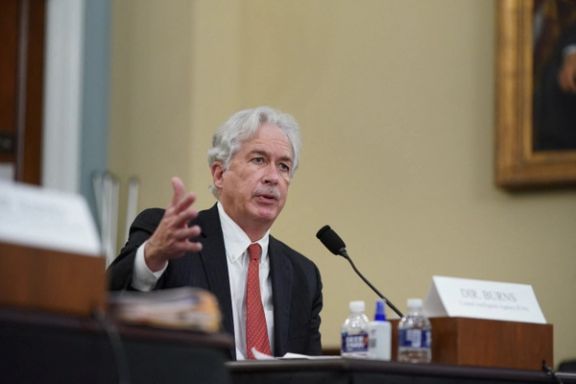
Remarks by CIA Director William Burns about Islamic Republic not pursuing an atomic bomb was also mentioned as being behind the halt in the devaluation of the rial. "We don't believe that the Supreme Leader in Iran has yet made a decision to resume the weaponization program that we judge that they suspended or stopped at the end of 2003," Burns said.
While merchants told Iran International earlier in the week that trading in Tehran markets had largely come to a halt as the rial was near its all-time low, the local media confirmed reports that the Central Bank of Iran intervened in the currency market to stop the freefall of the rial. On Sunday, the bank injected $700 million in UAE dirhams and the rial began to rise from its all-time low of 600,000 against dollar.
The rial’s plunge to 575,000 Saturday, February 25, exacerbated chaos in several of Iran's major markets and brought many businesses to near standstill. The rial fell from 35,000 to more than 600,000 against the US dollar in exactly five years. This led to very high inflation, officially at more than 50 percent, which has impoverished tens of millions of Iranians. An Iranian economist says the role of US sanctions in causing economic chaos in Iran has been significant.
All in all, the Islamic Republic seems incapable of major changes in the market as it is strapped for cash with some reports saying the government does not allow ATM machines to give cash more than the current limit of 2,000,000 rials – about $4, which barely can buy a hamburger today in the capital.
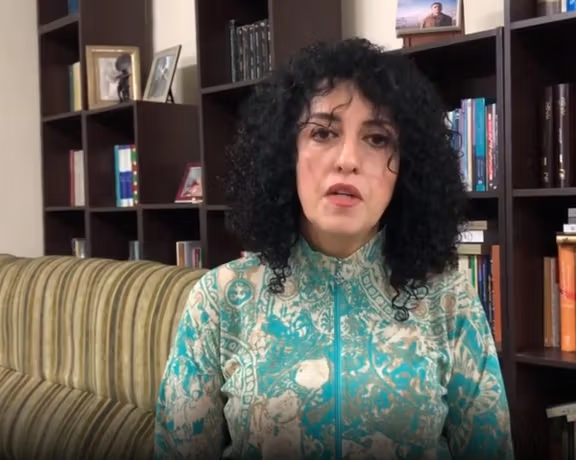
In response to Iran's foreign minister’s denials of rape in prisons, an imprisoned female activist announced she is ready to testify against the government.
In a letter sent to Radio Farda, the Persian Service of Radio Free Europe in Prague, Narges Mohammadi wrote: "In the past few months, detainees have been brought to the women's ward of Evin prison, and … subjected to sexual assault and physical torture. We have witnessed the traces left on their bodies.”
The civil activist, who has been in prison since 2016, also referred to the case of the elderly Baha'i poet and writer, Mahvash Shahriari, who has served 10 years in prison, and was recently arrested without any legal documents against her.
“She spent five months in solitary confinement [and] has suffered mental and physical torture,” emphasized Mohammadi.
She further expressed readiness "to testify in any place" as a "witness" regarding sexual assault and physical torture in prisons.
Amid the mass arrest of protesters within the past five months, numerous reports have been published regarding rape and assault on both men and women by regime officials in prisons, the first report published by CNN in November.
In response to the investigation, the foreign minister, Hossein Amir-Abdollahian, described the reports as "biased and false".